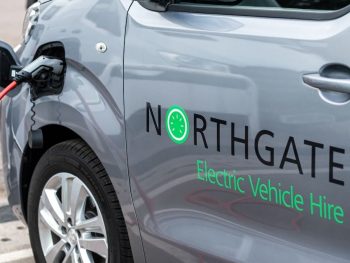Fleets are more worried about electric van choice and availability than driving range, Northgate’s new EV roadshow research has revealed.

Reducing carbon emissions is also a major priority, according to operators surveyed at Northgate’s latest EV roadshow event in Bristol.
The analysis, carried out to gauge perception of fleet electrification, showed that while more than 40% of operators are worried about the suitability of eLCVs for their business activities, a greater percentage (57%) are worried about the choice and availability of eLCVs.
Nearly half of fleets said reducing carbon emissions was their focus for onboarding eLCVs.
And while carrying capacity is often considered crucial by fleet managers – and eLCVs are perceived to lack the necessary payloads to fulfil their duties – Northgate’s research shows most vans are never driven with their maximum payload, or even a full cargo.
Melanie Creedy, EV business development manager at Northgate – which is exhibiting at this year’s Great British Fleet Event, said: “While the majority of our customers have always specified 3.5-tonne GVW vans, in actual fact, the majority of drivers rarely use their vehicle’s capacity to the full. This negates any fears around the diminished payload of eLCVs, and in some cases, means drivers can shift to a smaller vehicle with no impact to their daily working lives.”
Bristol, which launched a Clean Air Zone late 2022, also revealed some interesting findings for electrification.
The city is a commuter hub from some of the more rural areas of the UK – which means that some drivers are travelling long distances before they arrive at work in their vans.
“In this instance, Northgate may recommend remaining in an ICE vehicle. If, however, as is likely, a driver is doing much lower mileage in an inner city, it could be a simple process to adopt an eLCV instead,” concluded Creedy.
The Bristol event was the latest held by Northgate – to date, its EV roadshows have seen 56 fleets begin the process of EV adoption so far in 2023, and an 84% year on year increase in eLCVs on its fleet as a result.
“It’s crucial to begin such a change by understanding the actual usage of each vehicle on a fleet as well as the mileage and driving patterns of every driver. This highlights discrepancies between a fleet’s assumed usage and mileage, and the reality,” Creedy added.
Northgate’s nationwide EV roadshow programme has allowed fleets up and down the country to talk to experts, ask questions and importantly, test-drive a broad range of vehicles from popular fleet EVs such as the MG4, through to eLCVs and even e-bikes, in a low-pressure environment.
Analysis of a fleet’s vehicle usage provides valuable data to determine which internal combustion vehicles can be immediately exchanged for eLCVs, and which vehicles should be exchanged when vehicles with a higher range become available.
Northgate can provide eLCVs on a trial basis, without the need for a longer-term commitment, and these can be provided with Northgate’s EV and Charging Bundle, giving drivers access to a wide range of vehicles and a home charger all in one rental.
In addition, Northgate can offer full home or workplace charging infrastructure through ChargedEV and EV charging cards for charging on the go.

